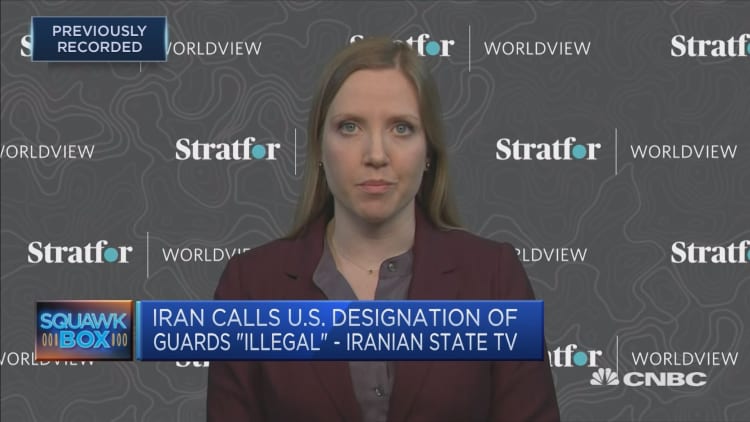
U.S. President Donald Trump on Monday designated a powerful branch of Iran's state military as a terrorist group, ratcheting up already tense relations between Tehran and Washington.
That move, however, "creates another tangle of legislation" that both countries will take years to get through, according to Emily Hawthorne, a Middle East and North Africa analyst at geopolitical intelligence firm Stratfor. Speaking with CNBC's "Squawk Box" on Tuesday, she added that Trump's unprecedented move will make future negotiations with Iran "more difficult."
"The future U.S. government, if they want to negotiate with Iran or negotiate with the Iranian military in any way, they're going to have to take the (Islamic Revolutionary Guard Corps) off of this list," Hawthorne said. "Otherwise, they would be technically negotiating with a terrorist organization."
Set up after the 1979 Iranian Revolution, the Islamic Revolutionary Guards Corp (IRGC) is the elite security arm of Iran's armed forces. It has significant influence in Iran's political system, economy and military.
Monday's decision — set to officially take effect on April 15 — marks the first time the U.S. Department of State has ever labeled a country's state military as a terrorist organization and adds yet another layer of sanctions on Iran.
"The IRGC is the Iranian government's primary means of directing and implementing its global terrorist campaign," Trump said in a White House statement released Monday.
Currently, Washington and Tehran are coming from "very different planes of negotiation," Hawthorne said.
"The U.S. wants to try and damage the economy to the extent where there's civil unrest, and an increasing pressure between the different political factions in Iran. They want that to pressure the Iranian government to negotiate with the U.S. or to engage in some changes," she added.
However, Hawthorne said Iran's government sees that as "very threatening behavior." After Trump's announcement, Iran's Supreme National Security Council said it would designate the U.S. Central Command as a terror group.
US-Iran military conflict unlikely
While Monday's historic designation is a "diplomatic tit-for-tat" and an "escalation politically," Hawthorne said it will not be a "direct cause for concern over more military escalation."
"It doesn't change the fact that Iran and the U.S. have been at loggerheads and often have faced off in some degree of military tension in the Persian Gulf over the past many years," she added.
Her sentiment was echoed by Richard Schmierer, the chairman of the board of directors at think tank the Middle East Policy Council, who said he is "very doubtful" that Monday's developments could escalate into a conflict.
Speaking to CNBC's "Street Signs" on Tuesday, Schmierer — who formerly served as the U.S. ambassador to Oman from 2009 to 2012 — said the U.S. branding the IRGC as a terror group "is significant, but is not that different than what's already been in place."
"On the Iranian side, and I know certainly on the U.S. side, there will be efforts to avoid any actual conflict," Schmierer added. "Because that really then takes you into uncharted territory."

